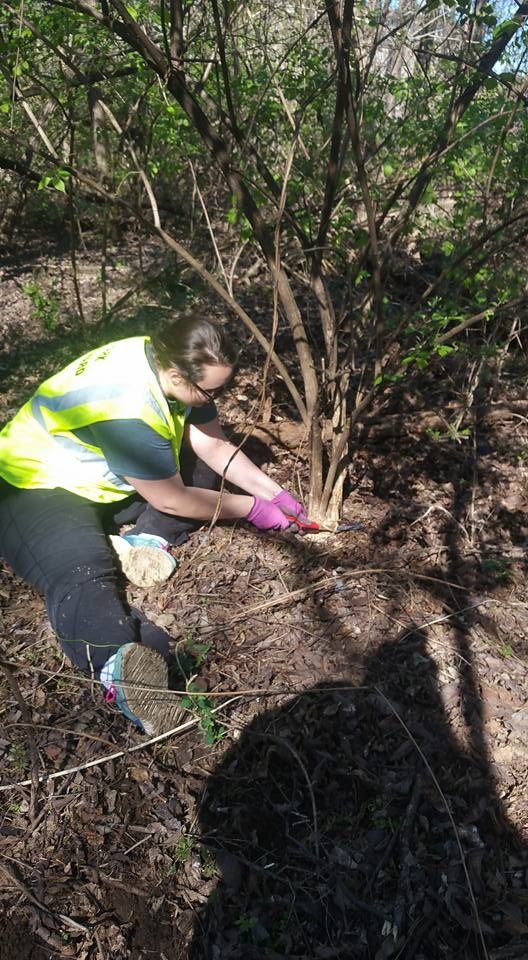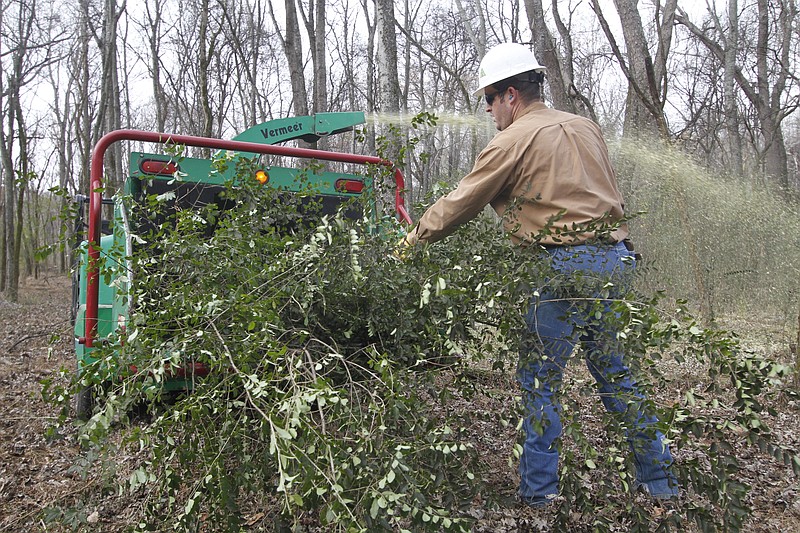 A member of the Chattanooga Park Stewards trims a hedge during one of their Weed Wrangles at Greenway Park. Sally Wencel is a member of the Chattanooga Park Stewards, and her workshop with Earthcare will focus on a similar topic; the elimination of invasive plant species from our public and private lands.
A member of the Chattanooga Park Stewards trims a hedge during one of their Weed Wrangles at Greenway Park. Sally Wencel is a member of the Chattanooga Park Stewards, and her workshop with Earthcare will focus on a similar topic; the elimination of invasive plant species from our public and private lands.
Spring is a time for gardening, but not all garden plants are made the same. In fact, according to Sally Wencel, a Master Gardener and member of the city of Chattanooga's Tree Commission, there are some that are downright harmful.
That's why she is leading a workshop at Greenway Farms in Hixson to educate the public on the dangers of invasive, exotic plant species and native alternatives to use instead.
The event is Saturday, March 25 and is compliments of EarthCare, a Christian organization that promotes stewardship of creation. Many invasive species - those which are non-native - can have a damning effect on the surrounding environment.
"I prefer the term invasive pest," said Wencel, who has been a Master Gardener with Hamilton County since 2010. "Many of these are garden escapees, and we intended to help gardeners be aware of the consequences of what they put in their yard," she said, referencing the Master Gardener program, which was created as a way to promote healthy and sustainable gardening practices.
Among the invasive species that have proliferated across the state are English ivy and privet, two plants that Wencel says choke out native vegetation and harm the environment as a result.
Privet, common as a privacy shrub, has easily dispersible seeds, few native pests that bother it, leaves that are only edible to certain animals and roots that leave a toxic chemical that prevents other nearby plants from germinating, Wencel said. All of these factors combine to make a plant that is extremely disruptive to native species.
When Wencel attends events with organizations such as the Chattanooga Park Stewards to pull invasive species from our public lands, she inevitably gets curious people asking what she's doing.
"When you tell them, most of them don't even know privet isn't native," said Wencel.
English ivy is similarly destructive to the area's environment, she said. Its dense and constricting vines expose bark on trees to insects and weaken and ultimately kill the tree. The dense root structure on the ground also makes it difficult for other plants to germinate.
Unfortunately, Wencel said information like this isn't easily accessible. That's why she leads workshops like the one planned for March 25 to educate the public about the ecological risks of invasive species and which ones to avoid.
"There are plenty of native hedges and evergreens that can replace privet," she said. "Arborvitae is available in so many different shapes, sizes and colors, and inkberry holly makes for an excellent privacy hedge."
Alternative ground cover plants for English ivy are also available in Tennessee, such as wild ginger and native ferns, she added.
The biggest issue, Wencel said, is that plants are never restrained to where you plant them. The seeds from those plants inevitably travel and germinate elsewhere, and even if the effects aren't immediately visible, they can wreak havoc on the sustainability of native species.
The event begins at 9:30 a.m. at Greenway Farms on March 25, but attendees must register by Thursday, March 23. EarthCare members will be providing a potluck lunch, and native plant species will be available for sale from Signal Mountain-based Trailhead Nursery, which works to protect and replace native species along the Cumberland Trail.
Visit earthcareonline.org/spring-workshop.html for more information.
